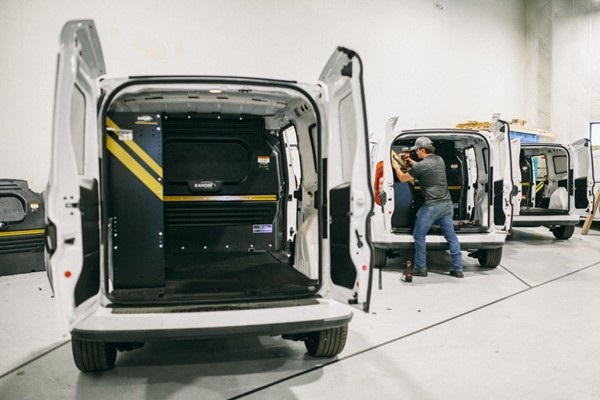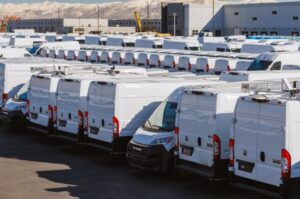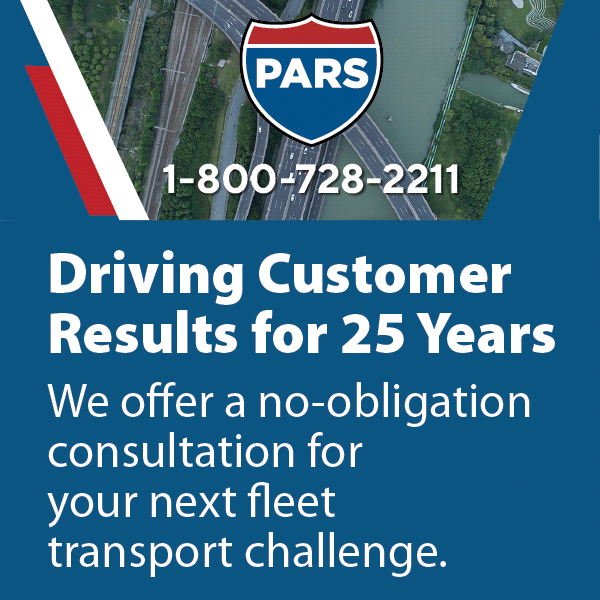
By Tanner Lee, Kingbee Vans
June 21,2023
Since the dawn of time, man has grappled with questions such as: Where did I come from? Why am I here? What is the meaning of life? Should I buy or lease vans for my commercial fleet? These questions are all equally difficult and philosophically impactful. Since the first baby fleet was hatched, these questions have plagued fleet managers and CFOs around the world.
Today’s fleet professionals continue to ask themselves if they should buy or lease vehicles, but they shouldn’t view the question in terms of one versus the other. The answer is tied to the larger picture of proper capital forecasting and the long-term impact your decision will have on your company’s finances.
- Owning an asset means controlling its acquisition cost, depreciation, operation, maintenance, repairs, and eventual disposal.
- Leasing a vehicle means that you only pay for the portion that you use, leaving you with more capital to operate and grow your business.
Most fleets finance their vehicles through a combination of buying and leasing because leveraging debt is a huge part of the growth equation. Order too many vehicles, and an underutilized fleet could cost you a fortune without generating revenue. Don’t order enough and you could miss out on new business.
When To Purchase
Purchasing makes the world your oyster. You can douse it in butter and slurp out the insides. You can order a bottle and impress your friends. Purchasing lets you not worry about going over your allotted miles or paying hefty fines for wear and tear. The biggest benefit to purchasing is that there are no restrictions—it’s your vehicle to play with or neglect, however you see fit.
Benefits of Purchasing
● Flexibility in vehicle disposal
● Reduced cost
● Tax benefits
● Equity reinvestment
● Boost in self-esteem
Who Should Buy?
Purchasing may seem like the intuitive option, but it comes with the greatest financial burden. Companies should only buy vehicles when they are absolutely certain how many they’ll need. This includes small fleets—like plumbing startups or neighborhood landscapers—who just need a couple of vehicles and don’t want to worry about mileage or damage. If a fleet doesn’t need enough vehicles to bring down the price of a lease, it makes sense to buy. Medium and large fleets will typically purchase a percentage of their vehicles to take advantage of various depreciation schedules.
When To Lease
“When I bought the Rolls-Royce, they thought it was leased.
Then I bought that new Ferrari, hater, rest in peace.”
-Meek Mill
Leasing means you only pay for what you use, like someone accused Meek Mill of doing when sourcing vehicles for a rap video. Luckily, his haters were mistaken.
Put simply, leasing means a lower monthly cost. There’s no obligation to pay the full value of the vehicle, and the upfront payment is significantly lower. The lessee enjoys all of the benefits of having new fleet vehicles without incurring additional costs or liabilities, making it easier to invest in and grow their business.
Benefits of Leasing
● Free up borrowing capacity
● Preserve capital
● Preview new safety features
● Replace vehicles easily
● Commitment issues? That’s okay!
Who Should Lease?
Fleets with over 50 vehicles will find leasing to be the most convenient way to acquire more vehicles. Similarly, enterprises with hundreds of vehicles will lease the majority of their fleet so that they are not obligated to pay the entire price tag upfront. Fleets that lease through an FMC will receive a litany of services, including more purchasing power and cost savings.
When Is Renting the Right Choice?
Vehicle acquisition is like being a sugar daddy, it’s purely financial. Historically, to lease or to purchase has been the only consideration. And rightfully so—after all, they’re good strategies, based on accounting, cashflow, etc. It makes sense to do one or the other, or both. However, the most effective fleets are able to adapt when uncertainties arise.
Renting makes sense regardless of your current funding strategy. What if you need vans quickly but only for six months, like during peak season or for a certain project? Or if you need to supplement your fleet while you wait for your OEM allocation? Maybe you want to test a new technology to see how it performs before making a major investment.
The main advantage of renting is the convenience it offers. Rental vehicles are readily available, meaning no more extensive paperwork and negotiations associated with purchasing or leasing.
Benefits of Renting
● Avoid maintenance costs
● Crush the peak season
● Ideal for high-turnover
● Save on ownership costs
● Return vehicles when you’re finished
Who Should Rent?
Small fleets, large fleets, short fleets, tall fleets—fleets of every size. Companies that experience high turnover or just need vehicles quickly. Renting is for when things don’t go as planned and waiting is not an option. Renting is for when time is money.
Renting Compliments Your Current Fleet Strategy
The lease, buy, rent question is not an either/or choice. For most fleets, the answer is all three, and it all boils down to which combination is the most cost-effective.
Acquiring vehicles can be a shot in the dark, but a combination of long-term and short-term assets will help you adapt to unforeseen circumstances. For example, package delivery and pest control companies use rental vehicles during peak season to prevent paying year-round for an asset that is only productive seasonally.
Renting Solves Your Fleet’s Variable Needs
Renting gives you flexibility and options. Renting is the guy she told you not to worry about. Say you own a small roofing company that just landed a lucrative project, and you need to hire a few more employees. Renting vehicles for project-based lengths is more efficient than purchasing new ones. It allows you to avoid committing to a vehicle that ends up becoming a “spare” when the project ends.
Kingbee Keeps Everything Running Smoothly
When vehicles aren’t available through traditional avenues, or when cashflow is tight, Kingbee provides vans right away. In 3-4 weeks, you could have new vans that are wrapped with your company’s branding and upfitted with shelves and racks, all without adding to the balance sheet.
Kingbee complements your current funding strategy and offers a third avenue for funding vehicles, alongside leasing and purchasing. Call today to see how we can help you meet your fleet goals.






